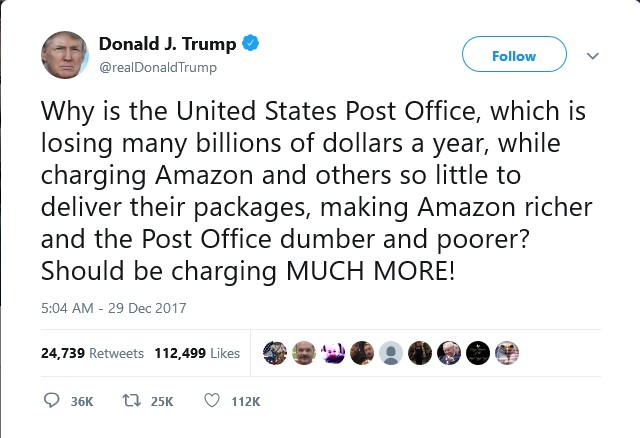The equity bloodbath is getting worse at every turn - almost as if President Trump’s administration is trying its best to put the final nail in the coffin of the longest bull market in history. As if the markets were not already badly spooked by escalating trade tensions, the pivotal technology sector came under heavy fire on Monday - again from the U.S. government.
On Monday, the famous FAANG quintuplet came back into the limelight - this time for all the wrong reasons. Facebook, Inc. (NASDAQ:FB), Apple, Inc. (NASDAQ:AAPL) Amazon, Inc.(NASDAQ:AMZN) and Alphabet, Inc.(NASDAQ:GOOGL,GOOG) all got badly slammed after reports emerged that the Fed will start investigating anti-competitive behavior by Big Tech. According to the reports, Facebook will face regulatory scrutiny by the Federal Trade Commission (FTC) while Apple, Amazon and Google will pay a visit to the Justice Department.
Adding fuel to the inferno, the House Judiciary Committee chimed in on Monday saying it would investigate anti-competitive practices within the tech industry.
Facebook and Google were hardest hit, with shares tanking 9.3 percent and 6.1 percent, respectively, after it emerged that the two would have to answer to antitrust concerns. There are rumors that the FTC is getting ready to slap Facebook with a multi-billion-dollar fine for monopolistic practices while Google has already been fined $1.7 billion by the EU for unfair advertising rules.
Apple and Amazon got off more lightly with their respective shares falling 4.6 percent and 1 percent.
Microsoft gets away
Only, Microsoft, Inc.(NASDAQ:MSFT), one of the Top 5 tech heavyweights, came away unscathed with no new antitrust allegations leveled against the software giant. Maybe that’s the case because MSFT has already paid its dues after having been at the center of one of the biggest antitrust investigations in corporate U.S. history during the Dotcom boom. Related: What To Expect As Driving Season Kicks Off
Overall, the selloff shaved nearly $120 billion off the tech stalwarts’ collective valuation. The four companies are among the most valuable companies on U.S. exchanges with a combined market cap of nearly $3 trillion.
Leading U.S. technology firms have increasingly been facing a backlash, both at home and abroad, over growing concerns that they wield too much power which they have been using unfairly to beat down rivals. Well, blame it partly on Trump, who set the anti-big-tech agenda well before he even got into public office.
In February 2016, Trump vowed to put Amazon into its place saying the company was "going to have such problems’’ if he became president. Back then, Trump’s bluster seems to have been motivated by a personal vendetta against Amazon CEO Jeff Bezos whom he accused of buying the Washington Post to advance his political agenda.
His second tirade was more direct, coming in December 2017 when he accused Amazon of putting thousands of small retailers out of business while also relying on subsidized services by the U.S. Postal Service.

Never mind that some of the president’s claims about Amazon can easily be discredited as being untrue.
There’s been no shortage of officials who have sided with Trump calling for more regulatory scrutiny over big tech. One such critic is William Kovacic, a law professor at George Washington University and a former FTC chairman, who has likened the growing outcry to a house on fire:
“The house is burning down here, and you guys are watering the rose bushes in the backyard. Put out the fire.’’
The jury remains out whether they will actually get their wish. Related: A Mentality Problem? Many Americans Can’t Afford An Extra $400 Expense
Unlike jurisdictions such as the EU, U.S. antitrust rules have become more relaxed over the years with what is adjudged as being anti-competitive behavior less clear than was the case in the past. We can clearly see that from Google’s case after the FTC closed the company’s antitrust investigation in 2013 saying its hands were partially tied. Some observers termed the ruling ‘‘disappointing’’ saying they were expecting stronger action.
The big problem here is that what might qualify as anti-competitive practices in other jurisdictions might not necessarily cut it in the U.S. While Google was found guilty of favoring certain search results (including its own) it’s much harder to demonstrate that this stifled competition or harmed consumers in any way.
The same case can be made about Amazon, with its often dirt-cheap prices clearly favoring the consumer.
As for Congress, well, last December’s farcical grilling of Google CEO Sundar Pichai provides a blueprint of what to expect when you charge lawmakers with the task of regulating a complex industry that few even understand.
Overall, as Stanford University law professor Douglas Melamed has told Fortune, it’s highly unlikely that the ongoing investigations will lead to any of these tech giants breaking up in any meaningful way.
By Alex Kimani for SafeHaven.com
More Top Reads from Safehaven.com:
















